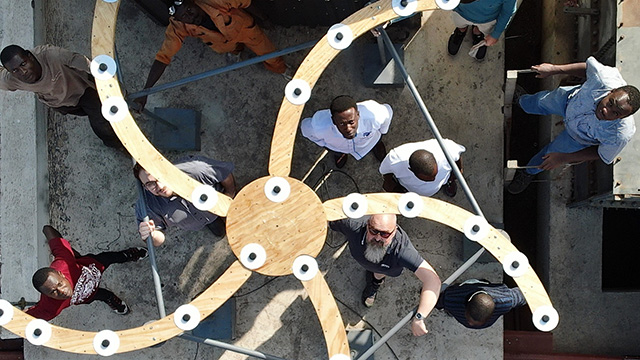By Staff Reporter
August 2024 marked another milestone for African radio astronomy with the successful deployment of another TART (Transient Array Radio Telescope) telescope in Kenya. The installation took place at the Technical University of Kenya (TUK), Nairobi, under the auspices of Rhodes University’s Distinguished Professor Oleg Smirnov, Dr Benjamin Hugo (South African Radio Astronomy Observatory – SARAO – and Rhodes), Mr Rikus Human (Alphawave), Ms Carla Sharpe-Mitchell (SARAO), and a team from TUK and the Kenya Space Agency (KSA). This follows on from a previous TART installation in Mauritius earlier this year.
This achievement highlights the collaborative efforts of multiple institutions and funding bodies committed to expanding scientific research and training opportunities across the continent.
TART is a low-cost, innovative telescope design developed by Dr Tim Molteno’s group at the University of Otago in New Zealand. This technology was introduced at Rhodes University in 2022 in a collaborative effort involving the University of Otago, Rhodes University, and Stellenbosch University. The deployment across African countries is part of a broader initiative funded by SARAO and supported by the Development in Africa with Radio Astronomy (DARA) programme, aiming to establish TART telescopes in various African partner countries.
The installation workshop at the Technical University of Kenya took place from 26-30 August 2024 and was led by Ms Malkia Kelelue from the Kenya Space Agency.
The new array layout, featuring antennas positioned on spiral arms, was designed for on-site fabrication, as well as to optimise imaging performance. The success of this installation is a testament to the meticulous planning and collaboration among international and local experts. The team successfully assembled and made the telescope operational by Thursday afternoon. “To me, the second deployment really proves the success of the concept. Mauritius was the first one, and we had to learn on the job. In Nairobi, we had a complete telescope built from scratch in four afternoons, virtually without a snag” said Professor Smirnov. “The new-generation TART-3 electronics developed by Dr Molteno are even simpler and easier to put together.”
The workshop also focussed on capacity building, with talks on radio astronomy and TART data processing data delivered throughout the week. These were delivered by prominent members of the team, including Dr Molteno, Dr Hugo, Dr Oozeer (SARAO, remotely) and Prof Smirnov. Topics included the TART project overview, technical aspects of the TART telescope, radio astronomy imaging, and working with TART data. The audience comprised university students, KSA staff, and members of the Kenyan research and education community.
As the TART initiative continues to grow, it promises to bring new research and training opportunities to African nations, further establishing the continent as a significant player in the field of radio astronomy. The programme’s ongoing success will undoubtedly inspire future generations of scientists and researchers across Africa.
For more background reading on the programme, you can visit Low-cost radio telescope brings new research and training opportunities for Africa.
This deployment in Kenya represents another critical step forward in enhancing Africa’s capabilities in radio astronomy, thanks to the dedication and hard work of the TART team and their collaborators.
In Memoriam of Mark Ndonga of KSA, who was a vital part of the installation team, but tragically passed away on 6 Sep.
KSA: https://ksa.go.ke/
DARA: https://www.dara-project.org
SARAO: https://sarao.ac.za
TART page at University of Otago: https://tart.elec.ac.nz/
Electronics Research Foundation: https://www.elec.ac.nz/
This article was first published by the Rhodes University Communication Division.


